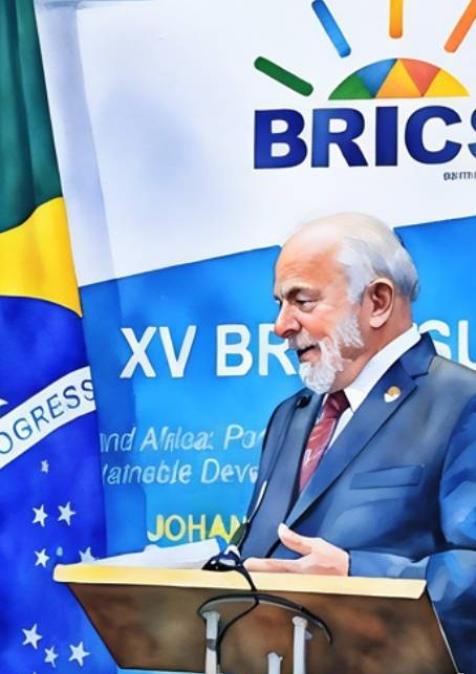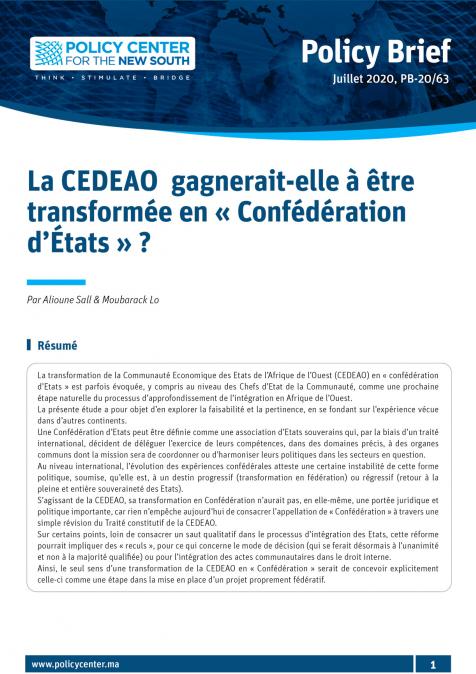Publications /
Opinion
The BRICS+ group of countries met in Rio de Janeiro over the weekend of 6-7 July. The original group – Brazil, Russia, India, China and, soon after, South Africa – emerged as the materialization of a work of fiction. Jim O’Neill, then chief economist at Goldman Sachs, produced a report in 2001 drawing attention to the rise of these countries as emerging regional powers in global economic growth.
A few years later, during the global financial crisis of 2008-2009, these countries decided to join in a common front to defend reform points in multilateral financial institutions, particularly Bretton Woods Institutions (namely, the International Monetary Fund and the World Bank). They called for increases in their voices and in shareholding and quotas, in line with the changes in the structure of global GDP that had occurred since the creation of those institutions. However, the experiences with the quota review of the International Monetary Fund (IMF) in 2010 and with the World Bank's capital increases in 2010 and 2018 made it clear that there would be limits to increasing their relative shareholding.
In the first half of the decade, the BRICS countries decided to create two institutions of their own that became part of the network of multilateral/regional development banks and the global financial protection network, respectively: the BRICS Bank or New Development Bank (NDB) and the Contingent Reserve Arrangement (CRA). It is worth noting that these new institutions were created more as a complement than as substitutes or competitors to existing ones. The evolution has been more like one “from Bretton Woods to a bridled path”.
The now expanded membership of countries, (Egypt, Ethiopia, Indonesia, Iran, the United Arab Emirates joined the original 5 countries, while Saudi Arabia has been invited to become a member) represent about 40% of global GDP in purchasing power parity (PPP) terms and almost a quarter of global trade and investment flows. They comprise the most significant source of global economic growth in this century. Although most trade flows in BRICS countries are with countries outside the group, intra-BRICS trade has doubled since 2020, showing that there may be a potential for further increase in complementarities.
However, this coming of age of the BRICS takes place in a context different from the one of its inception. The first fifteen years of the century were marked by what seemed then as a virtuous circle between the US as a world consumer of last resort, China and other Asian countries as main goods providers and consumers of raw materials, while many emerging markets and developing economies were providers of commodities.
This situation changed in the mid-2010s, with Russia being increasingly the target of G7 sanctions after the invasion of Crimea, the end of the commodities super-cycle, and China becoming the focus of escalating trade tensions with the US. Now, while the BRICS economies are already larger than the G7, measured in PPP terms, the group is in a much more complex and delicate relationship with the advanced economies.
It should not be forgotten that the group's agenda is, above all, economic and financial. After all, this is a group in which China and India inevitably have a rivalry, including territorially; the desire to counter the United States as a threat on the part of Russia and Iran – and, to some extent, China – is not shared by the others; there are disputes between Egypt and Ethiopia over the use of the Nile River, as well as disagreements between Middle Eastern members of the group. It is far from being a group with homogeneous views and geopolitical stances in relation to the G7 countries.
In this context, President Lula and Brazil were obliged to exercise diplomatic skills to perform three balancing acts in Rio.
First balancing act: reinforcing the leadership of the BRICS among emerging market and developing economies without antagonizing the G7. With the increasing polarization between US and China and the hostile relationship between Europe and Russia, the BRICS became a sensitive ground to coalesce developing economies. Moreover, from the standpoint of most members, deepening integration and cooperation among BRICS should proceed without contaminating other important economic relationships.
Second balancing act: expanding the BRICS membership without losing its identity and capacity to position itself in critical economic issues. While an expanded membership potentially brings more clout, the increased diversity of members may weaken the stance of the group in global economic issues where the interest and perspectives of members may have widened significantly with respect to the original group.
Third balancing act: fostering BRICS own institutions, namely the NDB and the CRA, without diverting from the effort to reform the Bretton Woods Institutions (BWIs).
With all those balls to juggle, President Lula tried to move ahead with a work plan. In this respect, on the year Brazil is hosting COP30, climate finance was a critical issue on the BRICS economic agenda and the subject of a specific declaration by the leaders.
There are other promising themes that still need to be developed to garner consensus within the group, such as initiatives to promote long-term investment. The discussions to establish a BRICS Multilateral Guarantees initiative, which will initially be hosted as a pilot in the NDB, has taken off, with a view to de-risk strategic investment and improve creditworthiness in BRICS countries, fostering private infrastructure and climate investment. Brazil also created a task force to continue a discussion on possible practical ways of enhancing BRICS countries’ reinsurance capacity, which is currently concentrated in advanced economies. Discussions on mechanisms to mitigate exchange rate risk have continued and the possibility of creating an infrastructure hub to share information on investment projects has been entertained.
Work has also continued to identify possible ways to improve the interoperability of payment systems, and facilitate fast, low-cost, more accessible, efficient, transparent, and safe cross-border payments among BRICS countries. Settlement of bilateral payment flows in local currencies has also been at the top of the BRICS agenda. It should be highlighted that the NDB has pursued efforts to use more local currencies, which now respond to almost a third of its finance projects, reducing its reliance on the US dollar. Furthermore, the CRA is at the last stage of a review of its main documents which will likely open space for the use of other eligible payment currencies.
In sum, Lula took the opportunity of Brazil’s BRICS presidency to send a strong message against protectionism and in favor a renewed multilateralism, trying to further BRICs-specific initiatives without burning the bridges with the advanced economies, which remain key historical partners of Brazil and other BRICS countries.
However, despite the exercise of BRICS balancing act, President Donald Trump threatened "extra 10% tariff over ‘anti-American’ BRICS policies". And, last week, he threatened to impose a 50% tariff on Brazil, making references to the legal process against former President Jair Bolsonaro for a planned coup plot, as well as to measures taken by Brazil’s Supreme Court against U.S .social media platforms.
Presumably, from Mr. Trump’s perspective, pursuing lower reliance on the US dollar was enough to push Lula and the BRICS off their balancing act.
Bruno Saraiva is a civil servant at the Central Bank of Brazil), having worked at the Ministry of Finance (2004-06), the World Bank (2006-07) and the Inter-American Development Bank (IDB)(2007-11). He was head of the Department of International Affairs at the Central Bank of Brazil(2011-16) and alternate executive director for Brazil at the International Monetary Fund (IMF) (2016-24). The opinions here expressed by Bruno Saraiva are personal and do not reflect the position of the Central Bank of Brazil or the Ministry of Finance.








